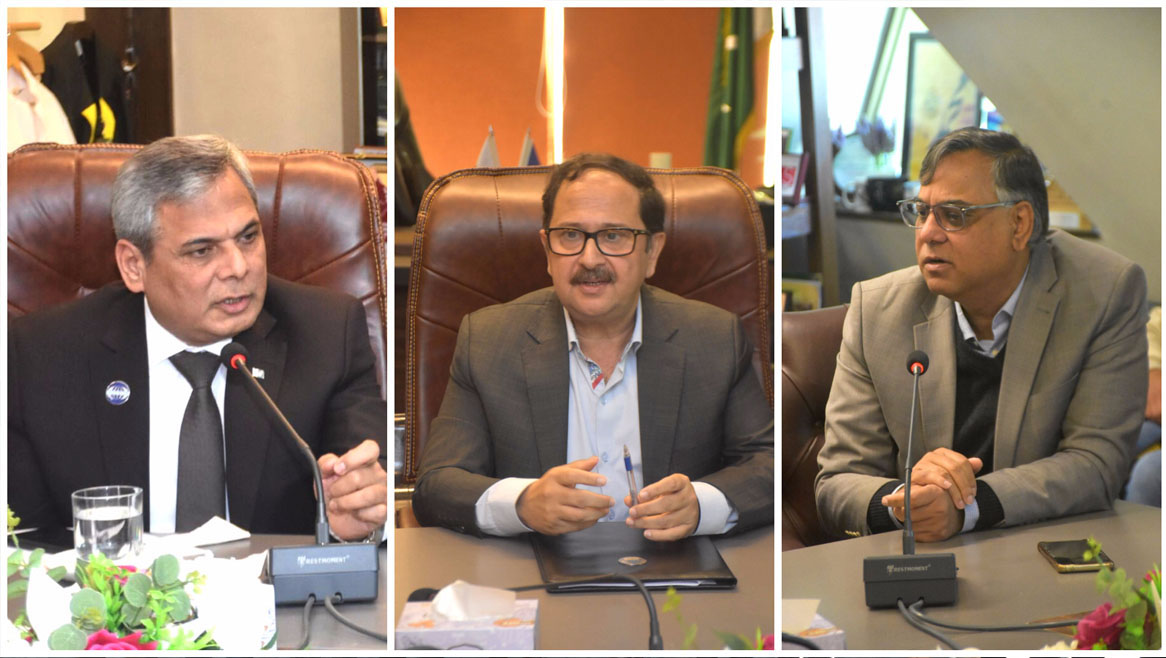COMSATS, in collaboration with the National Disaster and Risk Management Fund (NDRMF) and Kohsar University, organized a significant event on December 6, 2024, at Kohsar University, Murree. Themed “Addressing Smog and Its Challenges in Mountain Regions,” the event convened leading experts, academics, and policymakers to examine the multifaceted impacts of smog on public health, the environment, and economic resilience, with a particular focus on mountainous areas.

COMSATS, in collaboration with the National Disaster and Risk Management Fund (NDRMF) and Kohsar University, held an impactful event on the theme “Addressing Smog and Its Challenges in Mountain Regions” at Kohsar University, Murree on 6th December 2024. The event brought together leading experts, academics, and policymakers to discuss the multifaceted impacts of smog on public health, the environment, and economic resilience, particularly in mountainous areas.
The inaugural remarks were delivered by Prof. Dr. Syed Habib Bokhari, Vice Chancellor of Kohsar University, who shed light on the devastating health impacts of smog. He highlighted that globally, smog contributes to an alarming 7 million premature deaths annually, with Pakistan’s urban centers such as Lahore and Karachi experiencing drastic reductions in life expectancy. Vulnerable populations—including children, women, and the elderly—are at greater risk of respiratory and cardiovascular diseases, strokes, and cognitive impairments. Dr. Bokhari stressed the need for robust and immediate actions to mitigate these risks, especially in mountainous regions where the implications of smog are compounded.

Ambassador Dr. Mohammad Nafees Zakaria, Executive Director of COMSATS, emphasized the cross-cutting nature of smog and its wide-ranging impacts on sustainable development goals (SDGs). He underlined that smog disrupts education, tourism, and economic productivity—challenges that are magnified in mountain regions. Ambassador Dr. Zakaria called for government to incentivize cleaner transportation, promote electric vehicles (EVs), and enforce sustainable tourism and waste management practices. He also highlighted COMSATS’ initiatives to leverage scientific expertise in addressing climate change and air quality issues, such as the conversion of internal combustion engine (ICE) vehicles to electric vehicles using indigenous resources. This transformation, he noted, would not only reduce smog but also cut Pakistan’s fuel import bill, freeing resources for other industrial necessities.
Dr. Zakaria further underscored the importance of academic and business collaboration in tackling climate change-related challenges like smog. “The integration of academia’s research capabilities with the resources and innovation of businesses is crucial for creating scalable and sustainable solutions,” he stated.
Mr. Bilal Anwar, CEO of NDRMF, acknowledged the critical importance of addressing smog in Pakistan and highlighted the need for authentic data, robust infrastructure, and reliable air quality monitoring systems to drive informed decision-making. Mr. Anwar advocated for the use of advanced technologies, including satellite data integrated with ground sensors, to enhance the accuracy and reliability of air quality measurements. He emphasized the role of scientifically driven solutions in combating smog and building resilient communities.
Dr. Qaiser Imran, Environmental Specialist, National Institute of Disaster Management (NIDM) delivered a presentation highlighting the National Emergency Operation Centre’s role at NDMA in monitoring the ongoing smog situation in Pakistan and the surrounding region. The Centre utilizes advanced ground-based and space-based monitoring tools, enabling the analysis and projection of sectoral pollution emissions from various sources, including industry, transportation, and agriculture.

In addition to the discussions, the event featured a plantation drive and a nature walk, starting from the Resource Centre Murree (RCM) Dairy Farm and extending to Kashmir Point near the Governor’s House, further emphasizing the importance of community engagement in environmental conservation.
The event concluded with a call to action for stronger collaboration among government, academia, and the private sector to address the root causes of smog and implement effective mitigation strategies. The discussions reaffirmed the urgency of adopting science-based, innovative, and sustainable approaches to safeguard public health and protect the environment, especially in vulnerable regions like Murree and other mountainous areas.






